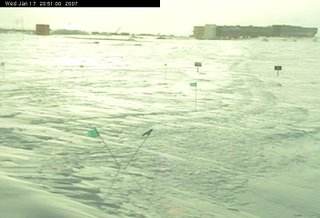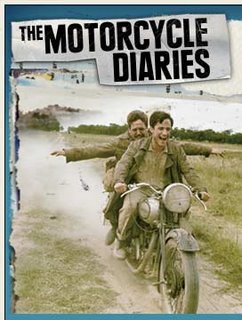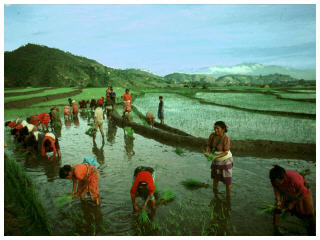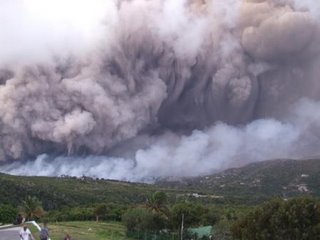 Categories: Atmosphere, Population, Writing and Assessment, s1 and s2
Categories: Atmosphere, Population, Writing and Assessment, s1 and s2...but this webcam image hopefully helps illustrate some of what I was talking about in Higher class on Friday. The picture was taken at a Weather station at the South Pole, and as you can see, although its around 9pm, it's still light. We were discussing solstices and equinoxes, and trying to put this in the context of why some areas of the planet have an energy surplus and some a deficit. The image was from one of the many excellent webcams available from
Earthcam, strangely being blocked by the school filter (not previously..). I am requesting the URL is unblocked for use in class, but have a browse yourself. Some of the urban cams are great. Back to topic, here's a
good animation which shows the 'shifting' equator quite nicely. Now someone asked me in class why the deserts were hotter than the equatorial regions, where the sun was more likely to be overhead. Tomorrow's lesson will look at how the earth moves air around to redistribute some of the sun's energy, and this should help us answer the question.
Prelims are just around the corner, so tomorrow, I am taking s4 through some revision work, where I think I will look for a bit of peer teaching. I am going to split the class up into pairs, break up the course, and ask the pairs to present something to the class by the end of the period. It could be a mindmap, a couple of slides, how you would answer a past paper on this topic, a class question and answer session, where you take the role normally given to me, including answering any queries. It's really up to you, but I am going to put one condition on the task-that you set some meaningful revision type activity that members of the class can do as follow up at home.
I want to move s2 along with the food miles project, but a reminder that your earth forces assessment will be due, and
there is some really good suggested revision, including games here. I am also wondering whether it would be feasible to have some kind of supermarket sweep on fair trade products, organic etc for the project, but I'm just thinking out loud here...
If I can get the computer room for s3, we can follow up jelly babies with an online population change activity, and if not, some follow up in the textbook, but also maybe a class audio activity to assess the usefulness of the previous day's game.
Finally, s1 are mapping Brazil after a really good and interactive discussion on perceptions, stereotypes etc. I have discovered that apparently Brazilian women are manly, that I shouldn't get in a taxi in Rio and that Sao Paulo is the biggest city...what's true and what's false?
 A post for s1 and s2 tonight. We are studying Brazil at present with s1, and I have previously said that I would be keen to use the 'Blame it on Lisa' episode of the Simpsons, where the family visit Rio. The reason that I am interested in using this is that the episode created such a storm of controversy in Rio itself that the City authorities threatened to sue FOX, the makers of The Simpsons( see here ).The reasob for this was that the epsiode did not represent Rio in a good light, and relied on stereotypes. We also held some stereotypes to be true, so I want to use this episode as an exercise to seperate truths from myths. Fortunately, one of my s1 boys has the episode, and is bringing it in tomorrow. For my other s1 class, we will be finding out more about population in Brazil.
A post for s1 and s2 tonight. We are studying Brazil at present with s1, and I have previously said that I would be keen to use the 'Blame it on Lisa' episode of the Simpsons, where the family visit Rio. The reason that I am interested in using this is that the episode created such a storm of controversy in Rio itself that the City authorities threatened to sue FOX, the makers of The Simpsons( see here ).The reasob for this was that the epsiode did not represent Rio in a good light, and relied on stereotypes. We also held some stereotypes to be true, so I want to use this episode as an exercise to seperate truths from myths. Fortunately, one of my s1 boys has the episode, and is bringing it in tomorrow. For my other s1 class, we will be finding out more about population in Brazil.















